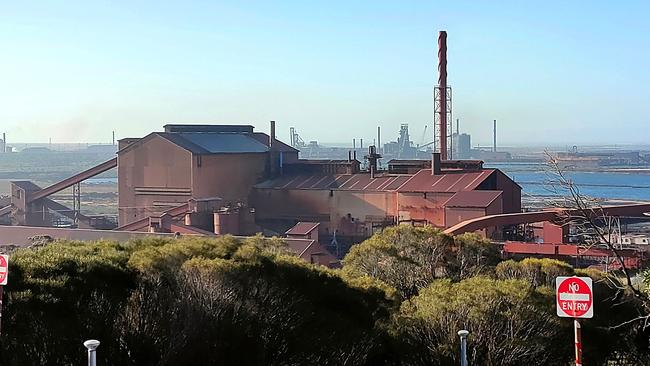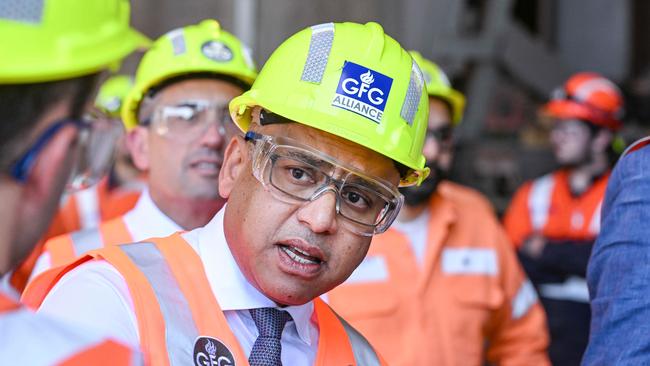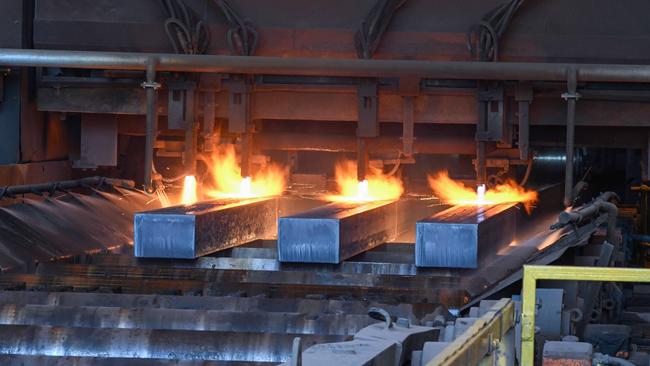Kept alive by 100 ‘MacGyvers’, Whyalla steelworkers resorted to bartering bog roll for oil


Shortages of toilet paper at the Whyalla steelworks under the management of Sanjeev Gupta’s GFG Alliance have become a standing joke. But how would you be if you had to trade precious stocks of other commodities in order to get hold of the stuff?
KordaMentha administrator Sebastian Hams told Whyalla locals and creditors on Wednesday the steelworks were only kept alive through the ingenuity of “100 MacGyvers” on staff, who kept equipment running despite the lack of resources.
But it seems MacGyver wasn’t the only TV character on show at Whyalla amid the cost cuts. Plenty of Arthur Daleys also popped up through the facility’s crisis, trading favours and goods – if not used cars – needed to prop the place up.

So tight were resources at the manufacturing plant in its latter days, as money dried up and suppliers refused to extend more credit, that staff hoarded precious consumables and traded them across the plant via a thriving barter economy.
In one case, Margin Call is told, one department was only persuaded to give up some of its precious stock of lubricant, needed to keep machinery running elsewhere, after a couple of cartons of desperately needed bog-roll were offered up in exchange.
Another group of workers were only saved from the stinking heat of a South Australian summer by an offer by a worker to stump up a couple of cartons of beer from his own poolroom in order to get the office air conditioner fixed.
Contrast that with the opulence of Gupta’s Potts Point mansion in Sydney, if you will.
Elsewhere in the rolling debacle in Gupta’s global empire, the former PwC auditor of Wyelands Bank – once a key plank in GFG’s trade financing efforts – copped a fine this week from the UK accounting regulator over its failure to spot the growing problems at the small bank, brought into the GFG fold in 2016.

Wyelands started out as a small savings and lending bank. But within three years of its takeover by Gupta about 85 per cent of its business was with companies introduced by its owner.
When Wyelands stopped trading in 2021 – after the collapse of Greensill Capital triggered a crisis across GFG – it put $1.5bn in the savings of about 15,000 households at risk.
PwC copped a discounted $6m fine for its failings.
As minimal as that is, it might give a few nervous moments for partners of the other audit firms that signed off on the accounts of dozens of GFG companies in the years before Greensill collapsed and brought matters to a head.
The lessons have already been learned, to be fair.
The auditors of Gupta’s UK-registered companies mostly quit a few years ago, citing concerns over the British industrial magnate’s failure to give them the group-wide financial information needed to work out whether they were solvent or not.
And in Australia Gupta’s Infrabuild has delayed releasing its own accounts, presumably due to related concerns from its local auditors, KPMG, the last time financial statements were filed.
Double trouble
How do you double the value of a Queensland investment property in under two months? You buy it back from yourself, of course ...
That appears to be the conclusion of BPS liquidator David Sampson, engaged in the task of trawling through the wreckage of would-be NDIS housing provider Saorsa Health and its network of affiliated companies.
Margin Call brought news on Wednesday of some of the more dubious transactions from Sampson’s report on the state of Saorsa’s head company, including $2.4m in loans for a foray into Cambodian dairy farming, questionable director loans and $4.3m in corporate credit card billing from director Aiden Garrison.
But like any property group, each of the six properties earmarked for development for use by NDIS recipients was held by its own company, with its own investors and – in theory – its own accounts. In all, investors tipped around $45m into Saorsa projects.
And a trawl through Sampson’s reports on the rest of the group reveals plenty of other questionable dealings from Garrison and former business partner Will McKellar.
Chief among them is the vastly inflated valuation of one Gold Coast property, bought by Saorsa Health for $1.9m in December 2000. Two months later it was sold to separate companies in the group for $4.1m – a land valuation that was subsequently used to promote investment in building in housing on the property. The difference, Sampson alleges in his report to creditors, was paid out to Garrison and McKellar equally.
Each report also gives an insight into the way money flowed through the group.
The company purportedly developing the Gold Coast property paid out $552,000 in management and servicing fees to head company Saorsa Health, according to Sampson’s report, and $545,000 in “participation fees”. When Sampson took control, it was a vacant block where “construction works have commenced other than clearing work”.
Another company that owned a vacant block, this time in Gympie, handed over just over $1m in fees to Saorsa Health, with Sampson still investigating three cash withdrawals made by Garrison and McKellar, worth a combined $292,000. Its books show it also lent around $1m to McKellar, Sampson’s report says.
Saorsa was looking to raise about $4.5m to develop the property, according to investment documents circulated by the company. The land is now worth $750,000, Sampson says, a fair bit above the $480,000 paid – but a mortgage worth $675,000 also sits over it, meaning investors in that particular Saorsa disaster are unlikely to ever see a dime of their money back.





To join the conversation, please log in. Don't have an account? Register
Join the conversation, you are commenting as Logout